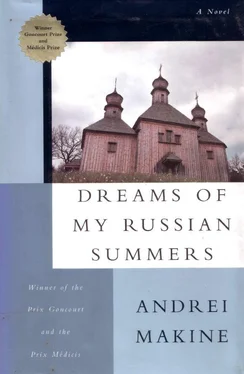When I crossed the Seine, the sky began to grow pale. For a while I had been walking with a sleepwalker's tread. The joyful fever of convalescence had disappeared. I felt as if I were wading through the still-deep shadows of the houses. My giddiness curved the perspectives inward, rolled them around me. The accumulation of apartment blocks along the quays and on the island looked like a gigantic film set in darkness when the arc lights have been switched off. I could no longer remember why I had left the cemetery.
On the wooden footbridge I looked back several times. I thought I could hear the sound of footsteps behind me. Or the throbbing of the blood in my temples. The echo became more resonant in a winding street that drew me along like a toboggan. I made an about-face. I thought I saw the outline of a woman in a long coat slipping under an archway. I remained standing, without strength, leaning against a wall. The world disintegrated, the wall gave way under my palm, the windows trickled down the pale fronts of the houses…
It was as if by magic that those few words appeared, outlined on a blackened metal plaque. I clung to their message, as a man on the brink of sinking into drunkenness or madness may cling to a maxim that has a banal but flawless logic that saves him from tipping over the edge… The little plaque was fixed a meter from the ground. I read its inscription three or four times:
Flood level. January 1910
… It was not a memory, but life itself. I was not reliving; I was living. Sensations that seemed very humble sensations. The warmth of the wooden handrail of a balcony hanging in the air on a summer's evening. The dry, piquant scents of plants. The distant and melancholy call of a locomotive. The soft rustling of pages on the knees of a woman seated amid flowers. Her gray hair. Her voice… And now the rustling and the voice are mingled with the whispering of the long boughs of willows – I was already living on the bank of that stream, lost in the sun-drenched immensity of the steppe. I saw that woman with gray hair, sunk in a clear reverie, slowly walking in the water and looking so young. And these youthful looks transported me onto the deck of a flatcar hurtling across a plain that sparkled with rain and light. The woman facing me smiled, tossing back the wet locks from her brow. Her eyelashes were iridescent in the rays of the setting sun…
Flood level. January 1910. I heard the misty silence, the lapping of the water when a boat passed. A little girl, her forehead pressed against the windowpane, was looking at the pale mirror of a flooded avenue. I lived that silent morning in a great Parisian apartment early in the century so intensely… And that morning led in sequence to another, with the crunching of gravel in an avenue gilded with autumn foliage. Three women in long black silk dresses, their broad hats trimmed with veils and feathers, were walking away, as if carrying the moment with them, its sunlight and the air of a fleeting era… Yet another morning: Charlotte (I recognized her now) accompanied by a man in the resonant streets of the Neuilly of her childhood. Charlotte, happy in a slightly confused 'way, is acting as guide. I felt I could distinguish the clarity of the morning light on each paving stone, see the trembling of each leaf, picture this unknown town in the man's gaze and the view of the streets, so familiar to Charlotte's eyes.
What I now understood was that ever since my childhood, Charlotte's Atlantis had enabled me to glimpse the mysterious consonance of eternal moments. Without my knowing it, they had traced the pattern of another life, as it were; invisible, inadmissible, alongside my own. Thus a carpenter who spends his days making chair legs or planing planks does not notice that the lacework of the shavings forms a beautiful ornament on the floor, shining with resin; one day, its clear transparency catches a ray of sunlight breaking through the narrow window piled high with tools, and the next, the blue-tinged reflection of snow.
It was this life that now revealed itself to be essential. Somehow, I did not yet know how, I must let it unfold within me. Through the silent work of memory I must learn the notation of these moments. Learn to preserve their timelessness amid the routine of everyday actions, amid the numbness of banal words. Live, conscious of this timelessness…
I returned to the cemetery just before the gate closed. The evening was clear. I sat down on the threshold and began writing in my address book, long since useless:
My situation beyond the grave is ideal, not only for discovering this essential life but also for recreating it, by recording it in a style that has yet to be invented. Or rather, this style will henceforth be my way of life. I will have no other life than these moments reborn on a page…
For want of paper my manifesto was soon going to peter out. Writing was a very important action for my project. In this high-sounding credo, I declared that only works created on the brink of the grave or indeed beyond the grave would withstand the test of time. I cited the epilepsy of some; asthma and the cork-lined room for others; exile, deeper than any tomb, for yet others… The pompous tone of this profession of faith was soon to disappear. It would be replaced by the pad of rough paper that I purchased the next day with the last of my money, and on whose first page I would write very simply:
Charlotte Lemonnier: Biographical Notes.
Indeed that very morning I left the family vault of the Belvals and the Castelots forever… I had woken up in the middle of the night. An impossible, crazy thought had just crossed my mind, like a tracer bullet. I had to utter it aloud to gauge its extraordinary reality: "What if Charlotte were still alive?"
Stunned, I pictured her coming out onto her little flower-covered balcony, bent over a book. For many years I had received no news from Saranza. So Charlotte could still be living much as before, as she had during my childhood. She would be over eighty now, but in my memory this age did not touch her. For me she always remained the same.
Then the dream flashed into my mind. It was probably its aura that had just woken me. To find Charlotte again, to bring her to France…
The unrealistic nature of this project, formulated by a vagrant stretched out on the stone slabs of a family tomb, was so evident that I made no effort to spell it out to myself. For the moment, I decided not to think about the details, to live, and to keep this unreasonable hope at the heart of each day. To live off this hope.
I was unable to get to sleep again that night. Wrapping myself in my coat, I went out. The warmth of the late autumn had given way to a north wind. I remained standing, watching the low clouds, which were gradually becoming infused with a gray pallor. I remembered that one day, in an unsmiling jest, Charlotte had said to me that, after all her journeys across the vastness of Russia, for her to come to France on foot would have had nothing impossible about it…
To begin with, during my long months of poverty and wanderings, my crazy dream was to seem very similar to her sad bravado. I would picture a woman dressed in black entering a little frontier town in the very early hours of a dark winter morning. The hem of her coat would be caked with mud, her big shawl drenched with the cold mist. She would push open the door of a café at the corner of a small sleeping square, would sit down near the window, beside a radiator. The patronne would bring her a cup of tea. And looking through the window at the quiet fronts of the half-timbered houses, the woman would murmur softly, "It's France… I have returned to France. After… after a whole lifetime."
When I left the bookshop I walked through the town and began to cross the bridge poised above the sunlit expanse of the Garonne. I recalled that old films had a time-honored trick for skipping over several years in the lives of their heroes in a few seconds. The action would be interrupted, and this legend would appear on a black background with an unashamed frankness that had always appealed to me: "Two years later," or "three years went by." But who would use this outmoded device nowadays?
Читать дальше












